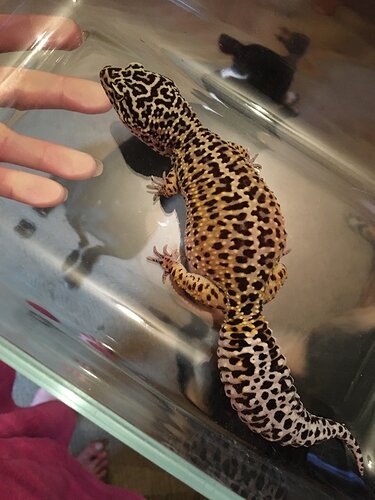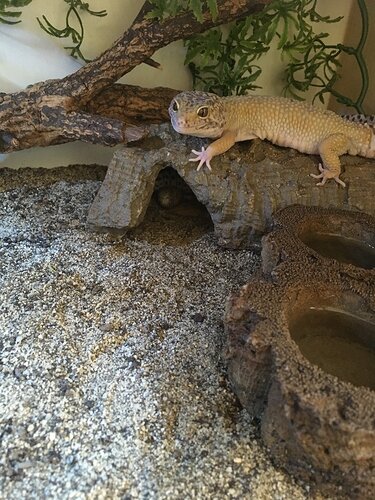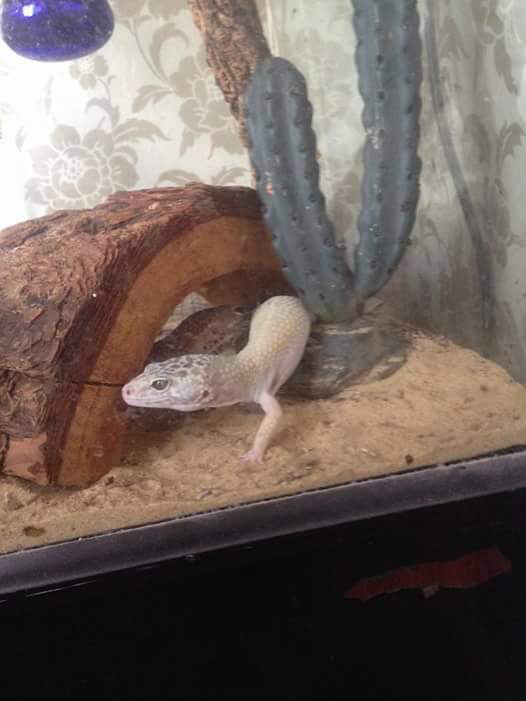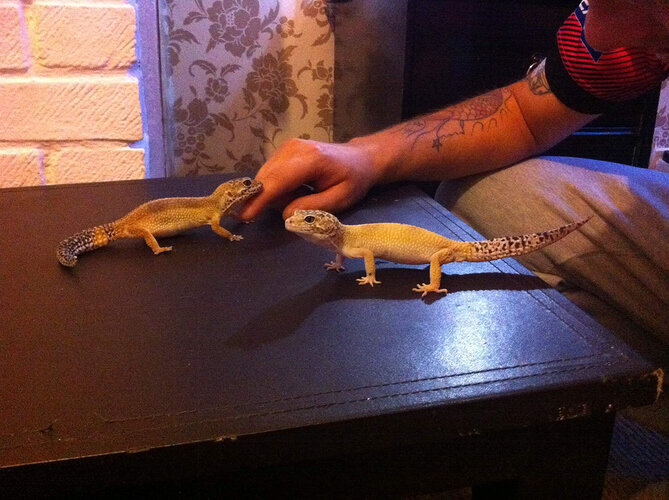Also my female laid 2eggs on Tuesday, I’ve incubator and appear to be dipping but they are more harder than soft, I did a candle test not long ago one egg appears to have a lot of red veins and covers nearly half the egg, the other has some red veins but not as many as the 1st egg and Alamo the 2nd egg seems to be more yellow inside than the 1st, does anyone know if these are fertile or not and how to sort the dipping out as it doesn’t seem to be filling back out like I was told it would?
How many grams does your female weigh?
I’ve no idea for the last 6 month or so they both say over load when I weigh them on scales last weights I know of are male 104g female 101 grams I got both gekkos as a young last year
@donna88 That female is seriously overweight. I have never seen a leo so round. The male looks fat too. @mblaney would you like to educate them on what a healthy gecko looks like? You also shouldn’t have sand as a substrate, it can cause impaction and kill your gecko quicker than them being obese.
This photo was taken Saturday she was abouts to lay her eggs, it isn’t sand I’m using it’s what the pet shop advised to get as I had a gekko for 8years on her own and I used sand then but I changed to this one on advise from the pet shop were I got both these gekkos from both gekkos was seriously under weight when i got them the female could barely walk
9 times out of 10 pet shops don’t know what is best for the animals and just try to push products for a sale. Loose substrates in general can cause impaction, and it is best to keep them on reptile carpet or tiles. Unless your geckos are giant types they should not be over 80 grams, with super giant males being the only ones that really reach over 100 grams. Even with eggs I haven’t seen a female that round or with that big of a tail. Just because they were underweight once doesn’t mean making them fat is any better.
Hi, it wasn’t and hasn’t been my intention to make them over weight, I’ve had them both for a year and a half, they won’t eat crickets or meal worms., they only eat wax worms approx once every 6weeks (as a treat) 9times out of 10 most of them get binned as either they don’t eat them or they’ve turned to moths in the tub they came in, and they only eat locasus and again it’s about 1box a week and bareing in mind when this grow wings my other half gets them out the tank so I don’t know how im over feeding when most is getting thrown away? I’ve just weighs them both, my make is 99g and my female is 101g and she’s also carrying eggs, what would you suggest I do to bring there weights down as I really didn’t know that they were obese so I’m quite shocked, and I’m even shocked I’m not using correct substrate, I haven’t had any problems with it or anything but if you could recommend what would be best for them it would be much appreciated
Wax worms are just fat with no real nutritional value. It is like a human being on a diet of only twinkies basically. The best foods for them are silkworms, black soldier fly larvae, small hornworms, and dubia roaches. Mealworms are also very fatty and superworms are mostly chitin so they aren’t a good staple diet. Crickets are alright (not the best) and you have to make sure to not leave them in with your geckos as the crickets can and will eat them. Do you dust the food with anything before feeding them?
For bringing their weight down, I believe just not feeding them would be best. Since the reason they store a bunch of fat in their tail is so they can go a long time without food in the wild. If you do feed the female give her black soldier fly larvae so she can get extra calcium for her eggs. And of course leave a thing of supplement powder in the cage for her at all times.
For the substrate I recommend reptile carpet. I believe you can get it at most pet stores, but you may have to order it. You will also need to order the bugs that I recommend. How long are your geckos? That will help determine a healthy weight for them.
I also don’t know what types geckos these are that’s another thing I was asking, I had a common femal gecko for nearly 9years , I fed her same as these two as again she would t eat crickets or owt, I Also had diffrent substrate Then and she weighd just short 68g
The female looks like a normal to me, and I will need better pictures of the male to identify him.
Yes I use the powder that I buy from pet shop I also get these little tub things that look like jelly carnt rennet what they are called though I’ll check when I go in again, I will try some of the foods you have suggested and I’ll change the substrate I’m using aswell, I only leave locasus in the tank nothing else but once they transform to the winged ones they get removed straight away, they haven’t had the meal worms for months as they didn’t really bother with them but they will not eat crickets or the black bug things I’ve tryed Them a few times
The female is a normal. The male is a hypo no albino showing in him. If you have any questions on care or feeding please feel free to pm me.
What kind of powder do you use? And I have no idea what kind of jelly you would be using for a gecko. Also, do you mean locusts? Basically crickets but bigger?
I agree with @ashleyraeanne that your female is very overweight (and possibly your male too), that they need a healthier diet and also that it’s a bad idea to keep a leo on any kind of loose substrate.
No, he does not appear to be an albino, he just has fewer spots, ‘hypo.’
No! Don’t abruptly stop feeding any animal- having to resort to only using their fat reserves to survive can cause major liver and pancreas problems and ultimately become fatal if unchecked. (Ok, I’m not certain reptiles have a pancreas, but the principal still applies.) Always reduce food intake very gradually.
What is a locasus? Whatever it is, uneaten prey insects should not be left loose in the tank because they may bite your geckos.
From reading, I get the impression that your geckos would really benefit from a bit more research, as you’ve mentioned several things about their care that will be hurtful long term. It’s very important that you NOT use the advice of pet store employees as the soul reference to base your care on, especially as they have misguided you a lot so far. I’m not up to addressing everything I’ve seen, but here are some resources I personally like:
Basic leopard gecko care
Another care sheet
Another
Regarding the importance of a proper diet
Another perspective
I know in the wild they can go without food for a long while, and from the sound of it they already don’t feed very often (at least what I got from their posts). The real problem is that they only feed wax worms. I would say BSFL would be the best diet food, maybe silkworms if they can get some. The chances of them eating that is higher than with dubias, given they seem to be addicted to wax worms.
Now it would really benefit us to know how long these leos are. That way we can figure out how much they should weigh. That said, I doubt these guys are giants or super giants given they cost a good bit usually. From what I understand the females never get that big and only the male super giants can get over 100 grams.
Also, for the locasus thing, I think they mean locusts >.>
I’m 100% sure about the effect of abrupt starvation on obese animals, including (in general) reptiles. It can cause hepatic lipidosis, which is deadly. Leopard geckos don’t make it into their 20s in the wild. Just like how sugar gliders in captivity can easily live 10+ years with proper care, but animals that old in the wild are unheard of, due to calcium/phosphorus and nutrition imbalance (sound familiar?).
BSFL aren’t a great idea for geckos that are picky eaters, they (generally) seem less palatable. Though it can sometimes take a while, transferring a gecko from one prey item to another is doable, though waxies are famously addictive. It’s pretty simple- buy healthy food items and waxies. Then crush the waxies into a pulp and rub it all over the outside of the healthier food item. I’ve been working on switching one of my geckos off of mealworms and it’s a pain, but i’m making slow inroads. All my other geckos were much easier to switch over to silks/horns.
Weight itself isn’t important at all, it’s BCS (body condition score). If an adult doberman and an adult rottweiler weigh the same thing, generally speaking, either the doberman is overweight or the rottie is underweight. It’s been very common for people to massively overfeed their giant and super giant geckos in the interest of making them seem ‘bigger’ and sounding more impressive on paper. A 400 lb man that is 6’ 2" isn’t actually bigger than a 6’ 2" man that weighs 200lb in any sense of having a bigger skeleton or genetic tendency for growth, he’s just morbidly obese.
I thought fatty liver disease was caused by overfeeding and obesity in reptiles. Meaning that they are already at risk for it with their diet being sacks of fat and whatever a locasus is (and being chonks). In the wild they would never be obese of course, so they would never experience what you are referring to since they would be used to long fasting periods. They are known to get to 15 years in the wild (probably just males) and can reach 20 in rare cases. Most leos in captivity don’t make it to their 20s either (from what I have seen), especially the females (stress on the body from all the egg laying?). Probably due to poor diet too though, since most people feed only mealworms.
I was more saying BSFL were best nutritionally, especially with the extra calcium (since the female had/has eggs). They also seem slightly easier to find than silkworms (for me at least).
I know weight isn’t everything, but if we know how long they are then we can give them an idea on how much healthy geckos of those lengths weigh. Mind posting some pictures of your geckos so they can see the ideal body condition of a leo? And how often should they feed em if they can’t break them of the waxworm addiction? From what I got from their posts they only feed locasus (locusts?) once a week? (and leave them in with the leos until they get wings??) and then waxies every month or so and are left until they turn into moths, however long that takes (still confused on half the stuff).



